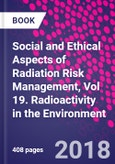Social and Ethical Aspects of Radiation Risk Management provides a comprehensive treatment of the major ethical and social issues resulting from the use of ionizing radiation. It covers topics such as nuclear fuel cycles, radioactive waste treatment, nuclear bomb testing, nuclear safety management, stakeholder engagement, cleanup after nuclear accidents, ecological risks from radiation, environmental justice, health and safety for radiation workers, radiation dose standards, the ethics of clinical radiology, and the principles of radiation protection and their ethical underpinnings. With authors ranging from philosophers to radiation protection officials and practitioners, the book spans from theoretical to practical implications of this important area of radiation risk assessment and management.
- Covers all the major social and ethical issues in relation to radiation protection
- Information is easily accessible and non-technical
- Authors include leading radiation protection officials as well as specialists who are more independent of the radiation protection system, thus presenting both authoritative and more critical views
- Includes theoretical perspectives as well as practical experience
Table of Contents
Preface 1. Introduction Part I. Ethical principles for radiation protection 2. Radiation risks and the ICRP 3. Moral thinking and radiation protection 4. A cross-cultural approach to radiation ethics 5. Ethical aspects of ecological risks from radiation 6. Why chemical risk assessment can learn from radiation protection Part II. Putting protection to practice 7. Ethical issues in clinical radiology 8. Ethics in practice protecting workers 9. ALARA: What is reasonably achievable? Part III. Nuclear accidents and how to prevent them 10. Lessons learned from the Chernobyl accident in Norway 11. Lessons from the Fukushima Daiichi Disaster 12. Environmental injustice in radiation dose standards 13. Safety culture and safety quality Part IV. Proliferation and the nuclear fuel cycle 14. The legacies of Soviet nuclear testing in Kazakhstan 15. Moral dilemmas of uranium and thorium fuel cycles Part V. Public participation 16. Social identities and public uptake of science 17. Stakeholder Engagement in regaining living conditions after Chernobyl 18. Public Participation potential and pitfalls 19. Can radwaste host communities be compensated without being bribed? Index








